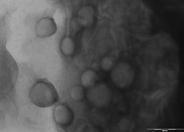
Acute critical care lung diseases like Acute Respiratory Distress Syndrome (ARDS) and Acute Lung Injury have a high mortality rate worldwide and especially in developing countries like India. Several diseases can lead to critical lung conditions of ARDS like malaria, leptospirosis, and undiagnosed fever followed by pneumonia, urinary tract infections, and pancreatitis. Mechanical ventilation currently used for therapy in ARDS by itself harms the lungs. At present, one of third of ARDS patients succumb to the condition within the first couple of days of intensive care. This condition is overall associated with an average mortality rate of 50% worldwide, ranging from 30-70% based on site and aetiology.
The proposed technology offers a solution to this unmet medical need. The proposed solution is a drug loaded surfactant nanoparticle aerosol that is effective in ARDS. It uniquely mimics the surface active layer in the lungs that reduce surface tension in alveoli (the terminal air sacs) and allow us to breathe easily. The surfactant also has the unique property to prevent disruption of surfactant function in the presence of inflammatory buildup in the alveoli. This technology acts as a life saving drug for a critical care condition, thereby meeting an unmet medical need. It also serves asa platform for delivery of drugs into the lungs for many other respiratory diseases.
Furthermore, it is useful for respiratory diseases of preterm babies like Neonatal Respiratory Distress Syndrome. Three Indian patents and one US patent have been granted for this technology. The technology has been validate in animal models and is ready for scale up, toxicology and clinical trials.
(Late) Prof. Rinti Banerjee
